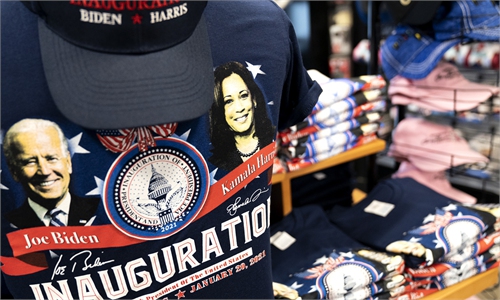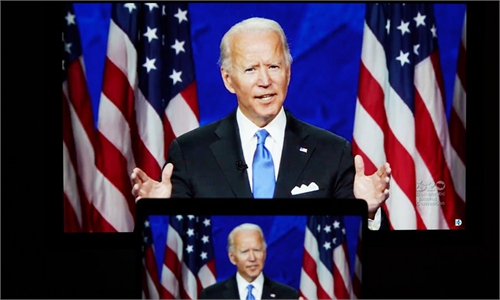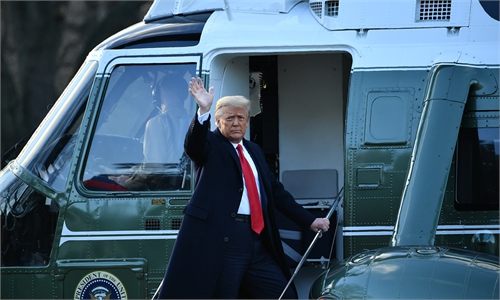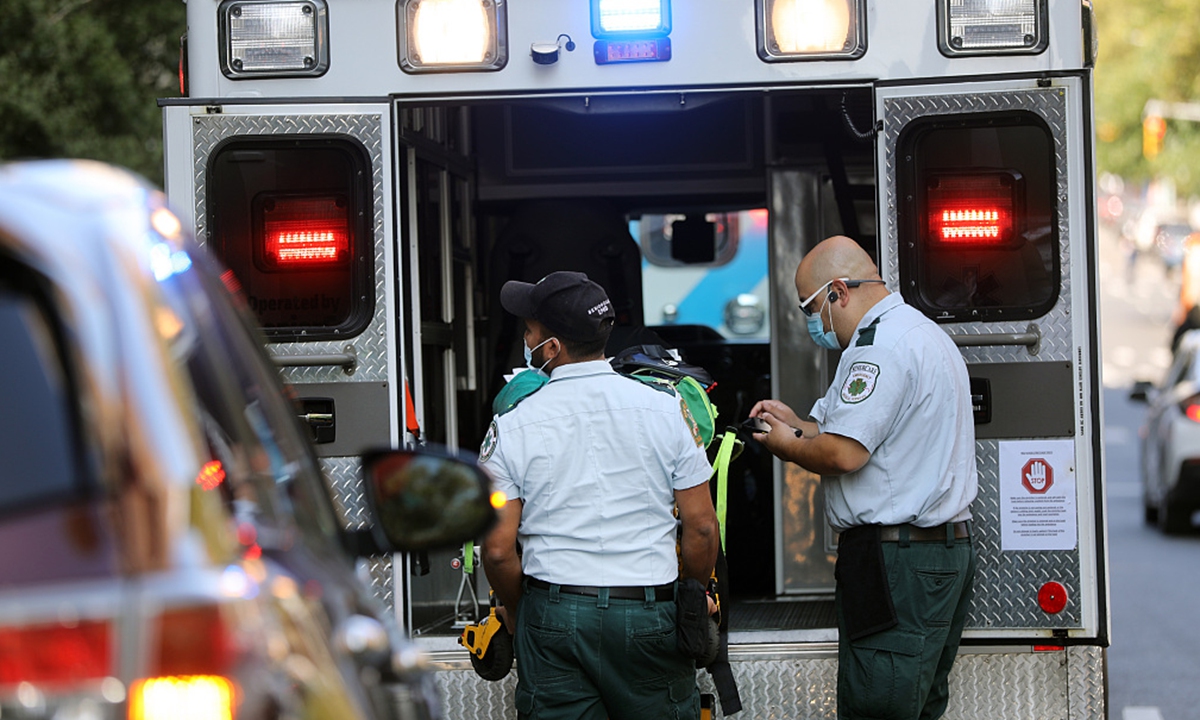
Photo:VCG
On the first day when Joe Biden sits behind the Resolute desk, what would be waiting for the 46th president of the US would probably be tons of documents and classified files describing how huge the coronavirus disaster this country has been facing over the year, exactly one year since the US Centers for Disease Control and Prevention (CDC) sounded the alarm about the outbreak.
As a large amount of video footages and pictures show hospitals overwhelmed by growing new daily cases across the US, frontline health workers had cried over the shortage of protective supplies, and are now protesting about the chaos in vaccine distribution. Biden has to face a very tough road ahead, not only because the US - the world's leader with an advanced healthcare system - saw the coronavirus death surpass 400,000, a new high, but also because the unmitigated public health crisis revealed deep-rooted problems of US governance.
While Biden led the first national mourning for coronavirus victims the night before the inauguration and the bell of the Washington National Cathedral tolled 400 times to mourn the 400,000 plus lives lost to the epidemic, he was also inheriting a huge mess despite pinning his hopes on the inoculation of vaccines. Ahead of the inauguration, Biden emphasized that the past year tested Americans in unimaginable ways, and that it's time for healing and overcoming this crisis together.
But how? Many Chinese and foreign experts have raised this question while bringing up a number of issues that the new administration needs to focus on in lifting the US out of its darkest moment, and to consider some of the anti-epidemic experiences proven to be successful in China to contain the viral spread.
The US has recorded the highest number of confirmed coronavirus infection cases, totaling over 24 million as of Wednesday, accounting for 25 percent of the total worldwide. And with 401,777 deaths, the US death toll also tops the world, accounting for about 20 percent of the global count, according to data from Johns Hopkins University.
Some Chinese observers called the US "the biggest loser of 2020," the year for human beings to fight and try to coexist with the virus. Its failed response, chaotic governance and irresponsible attitude also led the country - once the world's leader - to lose the high ground on both moral and political domains.
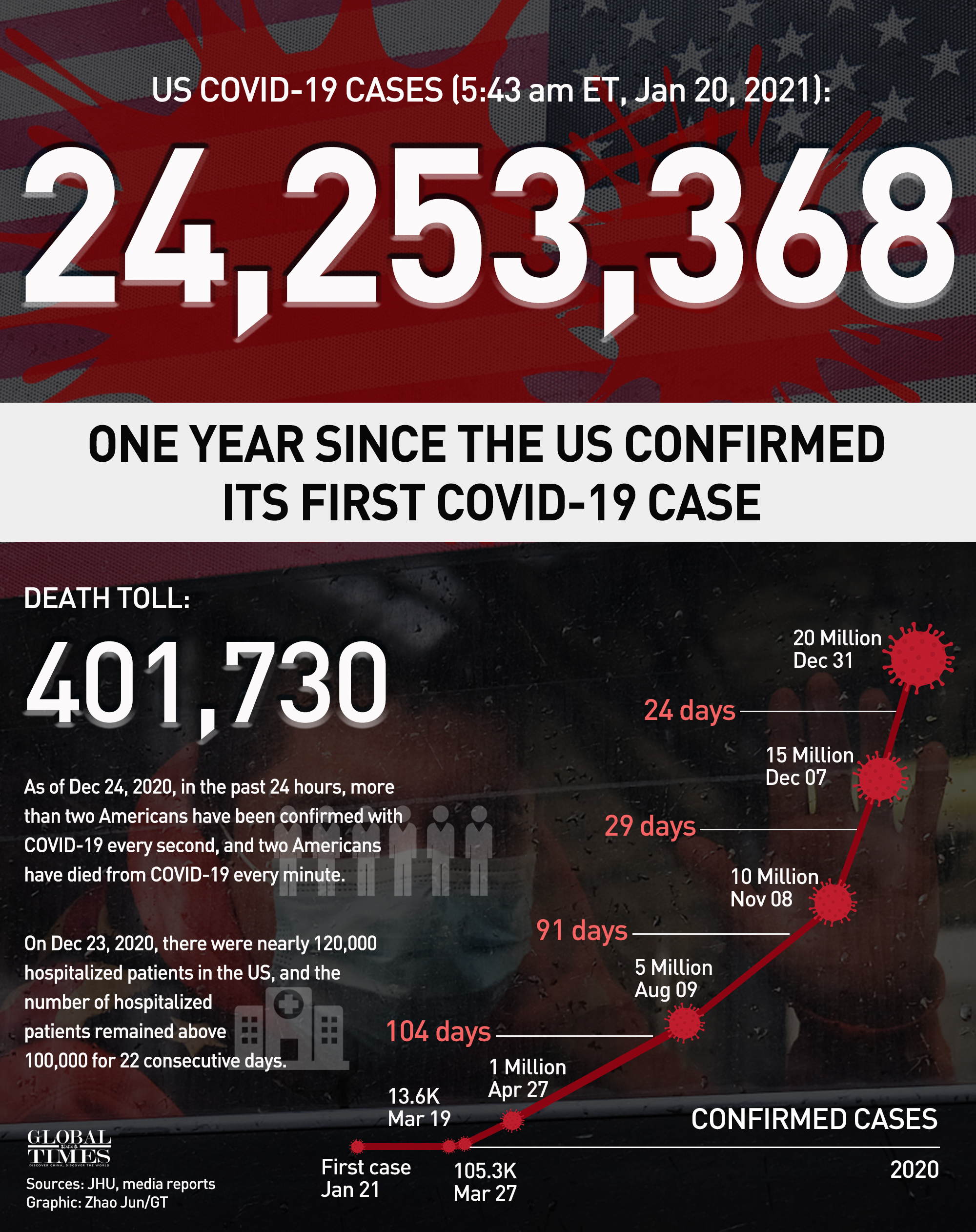
One year since the US confirmed its first COVID-19 case. Graphic: GT
Missteps, failed reflection
The US missed all the golden opportunities at the early stage, which dates back to early January 2020, when the US sensed the danger of the virus that had led to the outbreak in Wuhan and evacuated its citizens from the Chinese city. Yet, it failed to take swift actions back home to prevent the virus from spreading at its home soil, Zeng Guang, chief epidemiologist of the Chinese Center for Disease Control and Prevention, told the Global Times on Wednesday.
The US CDC reported on January 21, 2020 the first travel-related COVID-19 case in the US in Washington state. However, White House officials were worried that there weren't enough tests, and some congressmen criticized the Trump administration for not taking the outbreak seriously despite then-president Donald Trump assuring the public that "it's going to be fine," in early February.
The US became the country hit hardest by the COVID-19 since March 2020, with the highest number of confirmed cases, which was called by US media as "a grim milestone," and the country has seen the growth of new confirmed cases accelerating in the following months, which reached another peak in November when 2 million new cases were reported in two weeks. CNN said in a report in December that "every day, the number of families mourning the death of a loved one to COVID-19 keeps growing at a devastating rate," with an average of one coronavirus death every 40 seconds.
It took about 104 days for the US to see the total number of COVID-19 patients reach 5 million in August, but 91 days to hit the 10 million mark in November. And the figure kept growing at a drastic pace, reaching 20 million by December 31, 2020,according to data compiled by the media.
"There are two major problems in the US fight against the COVID-19 outbreak. One is the lack of testing and the other is a shortage of personal protection equipment (PPE)," Chen Xi, an assistant professor of public health at Yale University, told the Global Times on Wednesday.
From the time of the first reported case to mid-May, it took hundreds of days for the US to catch up with the testing capacity of South Korea, though the two countries reported their first cases about the same time, the expert said, noting that the yearlong trade war the US launched against China had also weighed on the supply of PPE, including facial masks, in the US.
The US took some time in early March to grant exclusions from import tariffs for dozens of medical products from China such as facial masks, Reuters reported. Even though China has produced about 120 masks for each American, some politicians, especially those anti-China hawks in the Trump administration, refused to listen to the CDC guidelines by rejecting wearing masks.
However, rising anti-intellectualism, which appeared to be a more important factor that impeded the US battle against the epidemic, also shocked the world. Violating social distancing requirements, rejecting the CDC's mask-wearing guidelines, spreading conspiracies about the virus and even demanding to fire Dr Anthony Fauci, the top US medical expert in leading the fight, caused the failure of the US anti-epidemic fight, according to observers.
"The US has almost never done a single right thing during its virus 'battle,' if it qualifies as a battle," Shen Yi, a professor at the School of International Relations and Public Affairs of Fudan University, told the Global Times on Wednesday.
Its failure is deeply embedded in its "rigged" system, and people cannot blame the Trump administration alone for the death of more than 400,000 Americans, Shen said. "He is the accelerator, not the cause," Shen noted.
The New York Times reported on January 13, 2021 that more than 10 percent of the US Congressmen had tested positive for COVID-19, and at least 60 sitting members have contracted the virus since the epidemic began, including 44 Republicans and 16 Democrats.
It's simple to understand states run by Democrats are not doing any better, Shen said, noting that the pandemic has exposed what he would called a "crisis of capitalism in the non-economic arena."
Will Biden save the US?
While fighting the COVID-19 will top Biden's agenda, some Chinese experts who have closely observed the US response to the outbreak doubt whether a change in leadership could really save America from the pandemic, when many considered accelerated mass vaccination might work out, while others questioned if the new president could come up with plans implemented systematically and scientifically.
More importantly, it still remains a question whether the new leader could take the matter from objective and scientific perspectives after a year of politicization and polarization of the epidemic under the Trump administration.
"Unlike China, which already accumulated abundant experience from SARS and other epidemic, the US has to start from the scratch. And the worse of all, the country was blindfolded by its political prejudice and refuses to learn China's experience," Zeng said.
From calling the COVID-19 "Chinese virus" by coming up with a so-called fact sheet suggesting the virus might have come from a virology lab in Wuhan, the Trump administration has kept on smearing China on the COVID-19 fight and shifted the blame to Beijing in its final days, ignoring the WHO calls to take the matter in a scientific manner.
At the same time, more Chinese people raised questions about whether the timeline of the US response to COVID-19 should be rewritten, given more early cases reported. For example, a coronavirus death in California was found weeks before the first known death was reported in the US, and Chinese Foreign Ministry spokesperson Hua Chunying recently called for transparency and an investigation into US bio-labs and Fort Detrick.
If the US truly respects science and facts, it should open the Fort Detrick laboratory and answer questions about its over 200 overseas labs, while inviting WHO experts to look into the origins and answer the international community's suspicions, Hua told a recent press conference.
"Although one year has passed, I don't think any US politician really understands how to contain the epidemic. If they understand, they will reverse its profit-oriented medical system and let it serve their people," Shen said.
Although Biden has proposed several ways to fight the virus, it has not yet stressed international cooperation, like joining hands with China, the only one country that has successfully put the epidemic under control, he remarked.


